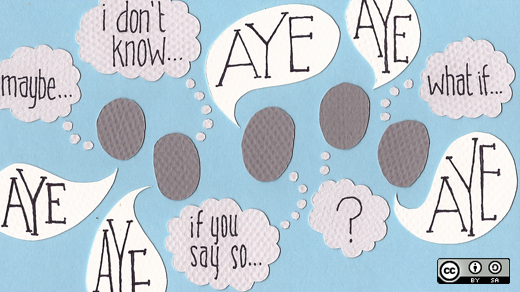I’m a big believer in collaboration. It's one of the main tenets of the open source way and a huge part of the design process. When done right, collaboration is about finding the right and diverse mix of people, collectively defining the problem and goals, and then collectively doing the work: researching, listening, thinking, sharing, tinkering, doing more research, more thinking, more tinkering, and more sharing until you get to a strategy that has conviction and truth.
But what about when collaboration goes wrong—when you get to the end of a project with a subpar output? I've found sometimes we confuse collaboration with a number of closely related (but very different) things – you know, like the distant cousin that looks like your twin but definitely isn't.![]()
- Collaboration is not getting everyone under the sun into a room—that’s a social gathering and typically not very productive. Identifying a diverse group of stakeholders thoroughly vested in the project's outcome is key.
- Collaboration is not an excuse to stand on the periphery nodding yes or nodding no—that’s lazy participation. Get your hands dirty. Truly try to understand the problem you are trying to solve. It will go a long way and lead to stronger ideas, solutions, and camaraderie.
- Collaboration is not permission to talk first, listen second—that’s more like dictating. Active listening, in my opinion, is one of the most important characteristics of productive collaboration.
- Collaboration does not mean you should design by committee—that’s when you end up saying a lot without saying anything at all. In the design world we say "a camel is a horse designed by a committee." You absolutely want to solicit diverse opinions, but stay grounded in the project goals so you can filter what input is going to help you best solve the problem at hand.
- Collaboration is not necessarily 100% agreement, nor should that be the goal—more often than not, that’s failure. You won't be meaningful when you are aiming to be everything to everyone. The best advice I can give you on this topic is to read this post from Seth Godin. (He nails it.)
Next time you are on a project team and things don't seem to be going quite right, do a quick gut check—are you dancing with the distant cousin of collaboration?



2 Comments